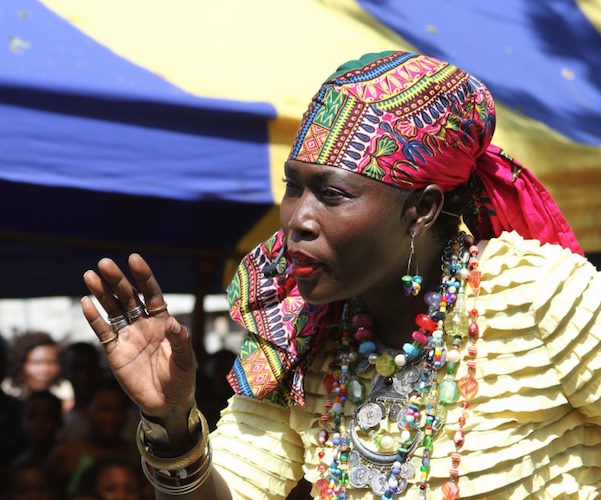Theater Preview: The Bard and Tennessee Williams
“Both poet/playwrights wrote with the same swings between tragedy and farce we live with now in America.”

A scene from the National Theatre of Ghana’s outdoor production of Ten Blocks on the Camino Real.
By Robert Israel
Bas Relief Park, at base of the hill that wends its way up to Provincetown’s Pilgrim Monument, will be transformed — by word, movement, and sound — when it becomes the location for the National Theatre of Ghana’s performance of Tennessee Williams’s one-act Ten Blocks on the Camino Real. Featuring a cadre of drummers and resplendently attired performers, the show is just one of the unusual offerings on tap for the 12th annual Tennessee Williams Theater Festival, which this year (September 21 through 24) is exploring the relationship between William Shakespeare and Tennessee Williams.
The Ghanaian troupe – Provincetown is part of a national tour that opened earlier this month in St. Louis – will perform under the direction of the Festival’s curator and impresario, David Kaplan. In an interview with The Arts Fuse, he says the African performers accentuate the poetic rhythms found in Williams’s work.
“You hear these same poetic rhythms in Shakespeare’s iambic pentameter verse,” Kaplan observes, “which is why Williams and Shakespeare are being paired for this year’s Festival’s theme. Both poet/playwrights wrote with the same swings between tragedy and farce we live with now in America.”
The plays selected this year include Shakespeare’s Hamlet, Pericles, and Antony and Cleopatra along with Williams’s Sweet Bird of Youth, Ten Blocks on the Camino Real, and selected short plays. As in festivals from previous years, acting troupes are traveling to Ptown from such far-flung locales as South Africa, Pennsylvania, Texas, and various places in New England. Performances take place indoors and outdoors — Gifford House Hotel, Provincetown Theater, Town Hall, Town Library, and Wharf House, to mention a few. The Spectrum Theatre Ensemble from Rhode Island will perform ‘The Hotel Plays’ program at the Gifford House Hotel. Audiences will move from room to room, experiencing the hyper-lyricism of Williams’ short plays Mr. Paradise, Talk to Me Like the Rain, and Let Me Listen. Just down the corridor other performers will stage scenes from Shakespeare’s Cymbeline and The Comedy of Errors – two plays that are set in inns. Peppered throughout the four days are mixers, parties, and even a clown show.
Heightened language is not the only connection between the two canonical dramatists. “Another unifying thread,” Kaplan explains, “is the uncertainty of the times both playwrights were living in. When Shakespeare was writing, Queen Elizabeth had died and no one knew what was happening next, the world was unstable. When Williams was writing, President Kennedy had been assassinated and it was a time of upheaval. Both playwrights create works during unstable times, yet both refused to create works that contained moral pronouncements.”
Kaplan argues that he sees the Festival’s offerings as doing more than simply resonating with our current period of discord and discomfort. They illustrate both playwrights’ interest in offering ways out of chaos. “Both writers say that you cannot conquer or alter the inevitability of unstableness of our world. Rather, you learn to cope with it.”
For both dramatists, love is a form of elemental resistance to havoc. At one point in Antony and Cleopatra, Cleopatra dispatches a eunuch to tell Antony of her love for him. He mocks the messenger, charging that he does not have the physical prowess to express love. The eunuch dismisses this crass observation, responding that, while that may be true, what he does possess is a heart and soul that can feel, and convey, the deep power of love. Note the ironic resonances with a passage in Sweet Bird of Youth, which will be performed at the Festival this year by a cast from Cape Town, South Africa.
“The biggest of all differences in this world is between the ones that had or have pleasure in love and those that haven’t and hadn’t any pleasure in love, but just watched it with envy, sick envy,” the protagonist concludes. “I don’t mean just ordinary pleasure or the kind that you can buy, I mean great pleasure…” Williams tells us that finding love is the path to survival. But it is not just any type of love – it is discovering what dramatist calls “the pleasure in love” that makes all the difference.
Shakespeare and Williams, Kaplan says, also share a melancholic sense that love is fleeting: “Love is short, and we have to seize it, because even in its full blossoming, the petals of the rose are about to fall from the flower. Both playwrights knew we live in an ephemeral world.”
Robert Israel writes about theater, travel, and the arts, and is a member of Independent Reviewers of New England (IRNE). He can be reached at risrael_97@yahoo.com.
